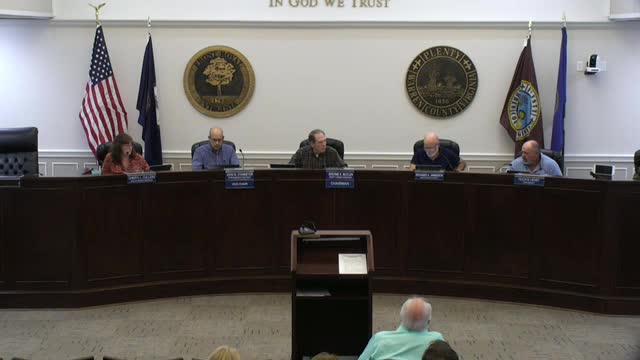Supervisor urges written legal analysis and FOIA policy before closed sessions; presents groundwater protection ordinance
Get AI-powered insights, summaries, and transcripts
Subscribe
Summary
A supervisor asked the county attorney to produce a written statutory analysis and urged the board to adopt a clear FOIA policy before holding closed sessions to discuss ordinances; the board then heard a presentation on a proposed Groundwater Protection Ordinance that would prohibit new industrial groundwater withdrawals while exempting residential and agricultural wells.
During the Oct. 14 Warren County working session, a board supervisor made a public procedural statement asking the county attorney to provide a comprehensive written statutory analysis of a proposed Groundwater Protection Ordinance and asked the board to adopt a policy clarifying when closed sessions are permissible under Virginia's Freedom of Information Act (FOIA). The supervisor reasoned that FOIA narrowly limits closed sessions and said prior closed-session requests this year were questionable under the statute.
After the FOIA discussion, the same supervisor presented a proposed Groundwater Protection Ordinance and a slide-based briefing arguing Warren County’s groundwater is stressed and that industrial users — in particular data centers — can consume vastly more water than households. The ordinance presented would prohibit new industrial groundwater withdrawals (while allowing industrial development that uses municipal water), exempt residential and agricultural wells, and grandfather existing businesses with conditional exemptions. The presenter asked the board to act proactively to protect private wells and county water security.
Key points and claims on the record: The presentation included these points, as spoken on the record: typical household water use 80–100 gallons per day; small industrial users 50,000–100,000 gallons per day; data centers 360,000–5,000,000 gallons per day depending on size and cooling needs. The presenter cited examples from other states and counties (a New York Times report on well failures near a Meta data center in Georgia and water-use accelerations in Northern Virginia) and referenced recommendations from Virginia entities such as JLARC (the Joint Legislative Audit and Review Commission) and Virginia Tech research asserting regional water stress. The presenter told the board that groundwater depletion is essentially irreversible and said the ordinance’s core provision would be to prohibit new industrial groundwater withdrawals while permitting industrial development on municipal or other sustainable water sources.
Board reaction and open questions: Supervisors asked technical questions about definitions, administrative roles and impacts on small businesses, and suggested edits: the draft ordinance references the Building Inspection Department in ways one supervisor said would be inappropriate because building inspectors do not handle well or septic permitting. Supervisors also requested clearer definitions for municipal use, whether exemptions attach to property or business, and potential effects on sites such as McKay Springs (a town-owned source discussed during the meeting). Several supervisors supported refining the draft rather than dismissing it; others stressed the need to rely on legal counsel to avoid exposure to litigation and asked for second opinions or FOIA Council input on when closed sessions are permitted.
What the board asked for: The presenting supervisor asked that the county attorney provide a comprehensive written statutory analysis detailing local authority, potential preemption or Dillon's Rule issues, citations and case law, assessments of litigation likelihood, and possible alternatives. The supervisor also asked the board to adopt a policy within 30 days establishing clear standards for when closed sessions are appropriate. Several supervisors said they were open to protective measures but preferred to have legal counsel brief them in closed session if necessary; others said they wanted legal guidance in public and stated they would consider seeking an opinion from FOIA counsel.
Next steps: Staff and the county attorney were asked to prepare legal documentation and to return with refined ordinance language and definitions. The board did not take a final vote on the ordinance at the work session; the item will proceed through the county’s normal ordinance and public‑hearing process if staff and counsel recommend doing so.
